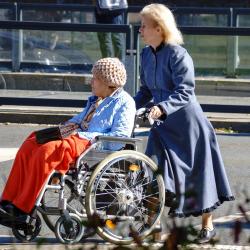Understanding Elderly Health Conditions and How to Support Them
As populations around the world continue to age, understanding elderly health conditions has become a topic of increasingly critical importance. For many, the golden years bring about a myriad of changes that can affect health and well-being. While aging is a natural process marked by accumulated wisdom and experience, it can also bring about a range of medical conditions that require careful attention and management.
Common Health Conditions in the Elderly
The elderly are more susceptible to a variety of health conditions, many of which can significantly impact their quality of life. Here are some of the most common:
-
Cardiovascular Diseases: Heart disease and stroke are leading causes of death among the elderly. Conditions such as hypertension, arteriosclerosis, and high cholesterol often require long-term management with medication and lifestyle adjustments.
-
Arthritis and Osteoporosis: Arthritis, including osteoarthritis and rheumatoid arthritis, causes joint pain and stiffness, while osteoporosis weakens bones, making them more susceptible to fractures. Both conditions can significantly affect mobility and independence.
-
Diabetes: Type 2 diabetes is prevalent among older adults, largely due to lifestyle factors such as diet and lack of exercise. Effective management involves medication, dietary changes, and regular blood sugar monitoring.
-
Cognitive Decline: Alzheimer's disease and other forms of dementia prominently affect seniors. They pose challenges not only to the affected individuals but also to their families and caregivers, requiring comprehensive care strategies.
-
Respiratory Diseases: Chronic obstructive pulmonary disease (COPD) and pneumonia are common and can be particularly dangerous in older adults due to decreased lung function and weakened immune systems.
-
Vision and Hearing Loss: Age-related macular degeneration, cataracts, glaucoma, and hearing impairment can diminish quality of life and increase the risk of isolation and accidents.
Providing Support for Elderly Health
Supporting the elderly in managing these health conditions requires a multifaceted approach that involves family, healthcare providers, and community resources. Here are some strategies to consider:
-
Regular Health Check-ups: Encourage routine medical examinations to monitor health conditions and catch any emerging issues early. Regular check-ups also ensure that vaccinations are up to date.
-
Medication Management: Help organize medications to ensure they are taken correctly and consistently. Use pill organizers or set alarms as reminders to prevent missed doses or overmedication.
-
Healthy Lifestyle Choices: Promote a balanced diet rich in fruits, vegetables, lean proteins, and whole grains. Encourage regular physical activity tailored to abilities, which helps maintain mobility and cardiovascular health.
-
Cognitive Stimulation: Engage in activities that challenge the brain, such as puzzles, reading, or learning new skills. Social interaction is also essential for, cognitive function and can help combat loneliness and depression.
-
Home Safety Modifications: Implement modifications at home to reduce the risk of falls and other accidents. This may include installing grab bars in bathrooms, improving lighting, and removing tripping hazards.
-
Emotional Support: Provide emotional and social support. Listen actively to concerns, foster open communication, and spend quality time, helping alleviate feelings of isolation and anxiety.
-
Utilizing Community Resources: Encourage participation in community activities or workshops designed for seniors. Many communities offer programs and services such as meal delivery, transportation, and caregiver support groups.
-
Advance Care Planning: Discuss preferences for medical care and end-of-life decisions. This might include creating living wills or health proxies, ensuring that their wishes are respected.
Conclusion
Understanding and supporting elderly health is not just a medical necessity but a societal responsibility that demands compassion, patience, and dedicated action. By recognizing common health issues and implementing supportive measures, we can improve the quality of life for our aging loved ones. As we prepare for a future where the elderly population is set to increase significantly, it becomes paramount to create environments where seniors can thrive, maintaining their independence and dignity well into their later years.






















